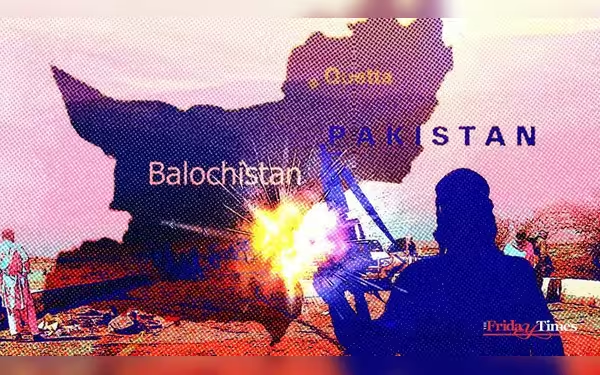Saturday, November 16, 2024 07:34 PM
Sustainable Solutions for Balochistan's Crisis
- Balochistan requires genuine political representation.
- Economic development must prioritize local needs.
- Cultural identity preservation is essential for unity.
 Image Credits: thefridaytimes
Image Credits: thefridaytimesExplore sustainable approaches to resolve the Balochistan crisis through political representation, economic development, and cultural preservation.
The Balochistan crisis has been a long-standing issue in Pakistan, raising significant concerns among policymakers and citizens alike. Since the insurgency began in 2005, the region has witnessed numerous violent incidents, leading to a deteriorating security situation. The question that often arises is whether a sustainable solution exists to this complex problem. The answer is a resounding "yes," but it requires a fundamental change in how the government approaches the situation.
To understand the Balochistan crisis, one must look at its historical context. The incorporation of Balochistan into Pakistan in 1948 was controversial, with many Baloch leaders arguing that it was done against the will of the local population. This historical grievance has been compounded by ongoing underdevelopment and the perception that the central government exploits the province's rich natural resources without adequately benefiting its people. Such feelings have fostered distrust and, at times, armed resistance.
Successive governments have often resorted to military force and short-term economic incentives to address Baloch dissatisfaction. However, these reactive measures have failed to tackle the root causes of the grievances, often leading to further alienation. Military operations, while aimed at combating insurgency, have resulted in civilian casualties and displacement, intensifying resentment among the Baloch population. Similarly, financial aid and development projects frequently announced with great fanfare often do not reach the grassroots level, leading to disillusionment.
To effectively address the Baloch issue, Pakistan must adopt sustainable and holistic policies. These policies should not only address immediate concerns but also lay the groundwork for long-term peace and development. A crucial aspect of this approach is ensuring genuine political representation and autonomy for the Baloch people. They should have a meaningful role in governing their province, including control over natural resources and decision-making processes.
Moreover, economic development must be tailored to the needs and aspirations of the Baloch people. Projects should prioritize local benefits, create job opportunities, and ensure equitable sharing of resources. It is also essential to improve education and healthcare in the region, as access to these services is a fundamental right. Currently, around 3,500 schools in Balochistan are non-functional due to teacher shortages, and about 16,000 academic positions remain vacant.
Additionally, the social and cultural dimensions of the Baloch issue must be addressed. The Baloch people have a unique cultural identity that should be preserved and celebrated. Integration efforts should respect this identity rather than undermine it. Promoting cultural understanding and fostering a sense of belonging within the broader Pakistani identity are critical components of this process.
The challenge of terrorism and unrest in Pakistan cannot be resolved through reactive measures alone. Sustainable policies that are inclusive and responsive to the needs and aspirations of the Baloch people are essential for lasting peace in Balochistan. By focusing on political empowerment, economic development, and cultural preservation, Pakistan can pave the way for unity, stability, and prosperity for all its citizens. With commitment and unwavering political will, a brighter future for Balochistan is within reach.













